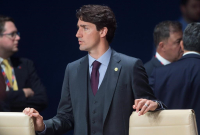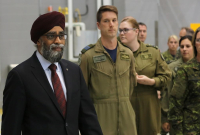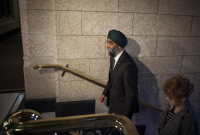Support strong Canadian climate journalism for 2025
Prime Minister Justin Trudeau has thrown cold water on suggestions the Liberal government wants to sign onto continental ballistic missile defence, or that it might send troops back into Afghanistan.
The question over whether Canada should be part of the U.S.’s continental missile−defence shield has been rekindled in recent days amid concerns about North Korea’s growing nuclear arsenal.
Canada opted out of ballistic missile defence in 2005 following a divisive national debate, but many defence experts and parliamentarians, including some Liberals, want the issue reopened.
Meanwhile, U.S. President Donald Trump’s plan to send thousands more troops to Afghanistan has also resurrected questions about whether Canada will be asked to follow suit.
Speaking in Montreal on Wednesday, however, Trudeau appeared to close the door on both ideas.
"On those cases, we will always take the decisions in terms of what is the best interests of Canadians," Trudeau told reporters after meeting federal and provincial immigration officials.
"And our long−standing positions on those two issues are not going to be changed any time soon."
The comments on ballistic missile defence were the strongest yet from the Liberal government, which has largely sidestepped questions about its intentions in recent weeks.
Whether the prime minister has succeeded in finally putting the issue to rest is another question, however, particularly if tensions between Washington and Pyongyang continue to escalate.
At least one Liberal MP has said Canada should reconsider its decision not join the U.S. missile−shield system, as have both the House of Commons and Senate defence committees.
The Liberals had also said in their recent defence policy that they planned to discuss with the U.S. ways to improve North America’s defences against, among other things, ballistic missiles.
Exactly what form those discussions will take — and what concrete measures will be taken to better protect the continent — remains unclear.
Trudeau’s position on Afghanistan was less of a surprise, as he had previously ruled out a NATO request for Canada to send police trainers to the war−torn country.
The last Canadian troops left Afghanistan in 2014, and despite concerns about a resurgent Taliban, the Liberals have instead emphasized Canada’s military contributions to Iraq and Latvia.
Still, it’s uncertain how the comments will be received by the Trump administration and NATO, both of which have called on allies to redouble their efforts and help end the 16−year−old conflict there.
"We will ask our NATO allies and global partners to support our new strategy, with additional troop and funding increases in line with our own," Trump said Monday. "We are confident they will."





Comments